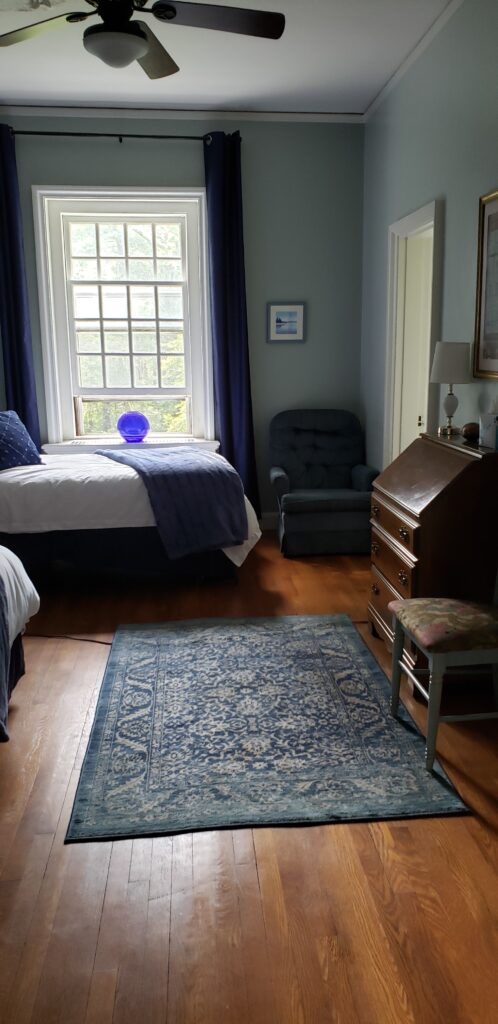Caregivers, retreat!
Sometimes the best thing to do in a stressful situation, especially a never-ending stressful situation, is to retreat and regroup. Settle yourself, soothe yourself, and return to reality with more resilience to stay centered instead of stressed.
During my years as my Dad’s caregiver, I was often in need of retreat time. During the stay-at-home portions of the Covid-19 pandemic, I was always eager for some retreat time. During both of those seemingly endless situations, challenges existed that made retreating seem impossible. But as they say, nothing is impossible. For anyone caring for others professionally or for family members, retreat or respite time is essential to maintain your compassionate presence and your sense of self.
Retreat or respite?
Family caregivers, I know it’s hard and yet so essential to take time for yourself. For caregivers, ‘retreat’ is often called ‘respite.’ Respite can be a week away but may also be daily opportunities to take some breathing room or create some space to breathe. Finding space and time while arranging respite and for someone else to meet your loved one’s needs are real-life challenges. You’ll find some suggestions in my blog, Mini me-time for family caregivers
I learned to take mini 10 minute retreats, and with lots of support, managed to heal more deeply during slightly longer retreats. Here’s how you can, too.
How to retreat, for caregivers
Retreating from stress takes three steps.

- Carve out some time for yourself: 10 minutes, 1 hour, ½ day, or a weekend. If you can’t find time at first, be open to possibilities.
- Go somewhere you won’t be interrupted or called upon for assistance. That might be outside, in your room or home, or far, far away. Closer to home, you can hide in your car, stop at park on your way home, or lock yourself in a bathroom. Nurses, is there is a renewal room on your unit?
- Do things you find soothing and/or make you smile. If you’ve been exceptionally overwhelmed, you may have forgotten what soothes you and makes you happy. For some inspiration, visit Free Stress Relief Tools | TLC, The Lyman Center for Caregivers . You’ll find calming recorded guided meditations you can listen to over and over, a gallery of stress management practices, and simple soothing ideas for when you just can’t relax. Select what appeals to you!
What to do on retreat
Here’s a few examples from my own experience. My suggestions might be simply perfect or spark a better idea that is more relevant to your needs.
10 minutes
- Take a walk, inside or out.
- When at a hospital, a walk to and from the chapel or gazing out a window with a view can help.
- Sit in the garden, preferably out of sight of the house
- At work, take a break with a couple of yoga poses.
2 hours to a half day
You can do a lot in a few hours. What a gift that time is! Sometimes I pack a backpack with ‘retreat’ supplies so I can grab it and go when opportunities present themselves. What to do? Here are some ideas.

- Journal
- Music
- Create art (keep your art supplies available)
- Go to a local park
- Photograph nature
- Meditate
- Nap
An entire day
Set your intention for the day, or simply wake up remembering, “I can do anything I want today!” These three blogs are filled with inspiring and creative ideas:
- Twenty five at-home ideas: Thanksgiving Spa Day, at Home | TLC, The Lyman Center for Caregivers
- Twenty five MORE things you can do at home: Alone at Home for the Holidays | TLC, The Lyman Center for Caregivers
- A day of heart-centered self-care, with a free planning guide to download: Home alone for Valentine’s Day? | TLC, The Lyman Center for Caregivers
Weekend
For me weekend retreats are the most difficult retreats to schedule, even if I’m retreating mid-week. But 2 day retreats are so worth it, as I receive more resilience and release more stress when away from home. You can camp, reserve a hotel room, rent a house, or stay at a retreat center. Swapping homes with a friend or family member might work for some of you.
My weekend retreat experience

This past weekend, after 18 months of Covid 19, intense family caregiving, economic challenges, a sick beloved dog, and working exceptionally long hours, I needed to stop and reset my center. That’s a lot like rebooting your computer or mobile devices.
My retreat plan was carefully considered due to ongoing Covid-19 precautions and closings. I decided upon a retreat at Rolling Ridge Retreat and Conference Center, only about 30 minutes from my home in Massachusetts. It’s an enormous place, inside and out. I reserved my own room with an en suite bath, refrigerator, microwave, and sitting area. Access to all common spaces and grounds was shared with only two other guests! For less than $100 a night!
What to do on a weekend retreat
Well, there are a few answers to that question. You might sign up for an organized retreat program. You might plan to do nothing at all. Or you might have a clear purpose – sometimes I retreat to write or complete a project.
For my retreat at Rolling Ridge, I planned nothing and packed a bag of enjoyable things to keep me busy. Here’s how the weekend evolved.
- Arrived 2:30pm on Friday
- Walked, walked, and walked around the thirty-eight beautiful acres
- Heated up my byo dinner
- Finished the novel I’ve been trying to read for weeks
Saturday
- Up early to see the lake and walk a bit before breakfast
- Ready to sit still, I sat gazing down the allée to the lake, considering and reflecting about where my family and my work are after 18 months of chaos.
- I filled a few pages of my journal with topics I needed to get out of my system.
- A few more journal pages filled with hopes, visions and ideas for a less-frantic future.
- Paused for a while to remember a friend who had recently passed on and acknowledge my feelings about her loss.
- After releasing all that, I was ready for a nap. At 10:30am! On retreat, I can do anything I want!

Saturday afternoon to Sunday
The rest of day two and the final morning at Rolling Ridge were filled with things I enjoy doing but have been too busy for.
- Skimmed a new book on self-acupressure making note of the protocols I want to try, and practicing some of the acupressure points
- Created sketches to embroider on a set of cloth napkins for nature-loving friends
- Wrote two blogs for Calm and Centered (including much of this blog)
- Watched Cornell University’s new video about raptors on You-Tube. At 90 minutes long, I could not find time for it at home.
- In the evening, I started a new novel.
Benefits of a retreating
Any time you stop the stress cycle, there are benefits to your whole self, body, mind, and spirit, and often to your relationships, too. In Am I stressed? I list some of the effects of stress; taking a retreat has the potential to reverse many of those effects.
After my retreat, I was initially grumpy. After a couple of days, I realized I was grumpy because my outlook had changed, but the chaos I had left behind was still there. Of course it was. My new outlook didn’t get rid of chaos, but some of the ideas I had while away might. As always, change takes some time. On a positive note, I realized I was falling asleep faster, sleeping deeper, and waking up rested. Settling into meditation was easier. Back and neck pain responded quicker to progressive muscle relaxation and my new acupressure techniques. I reacted differently, less abruptly, to friends and family. I had noticed our household completely revolved around our beloved elderly dog’s bowel, bladder, meal and sleep schedule, and resolved to seek compassionate ways to restore some balance to the household. I felt less restless, less busy, which conversely resulted in getting more done at home and work.
Creating retreat time
Even knowing the benefits, I find retreat time difficult to create. How about you? Trying to ‘find’ time is hopeless, but ‘creating’ time is possible. To be honest, it took me a full year to create this weekend’s retreat at Rolling Ridge. Lee in guest services has been so patient with me! In the meantime, I made do with shorter retreats at home. The ‘ideal’ length of time for a retreat is a balance of (1) the time you have available and (2) how great is your need to retreat.
If taking a retreat seems like an unattainable dream to you, shift your thinking and make it possible. Years ago, Charlotte (Charlie) McGuire, the founder of the American Holistic Nurses Association, inspired me with these words. She shared them over and over again with many, many nurses.
“Imagine your dream.
Hold it expectantly in your consciousness.
Watch it unfold.”
– Charlotte McGuire
Charlie emphasized the word ‘expectantly.’ Allow yourself to feel excited about your upcoming retreat. With hope, know it will happen. Be alert for opportunities, and watch your retreat unfold!
In peace,
Gale
